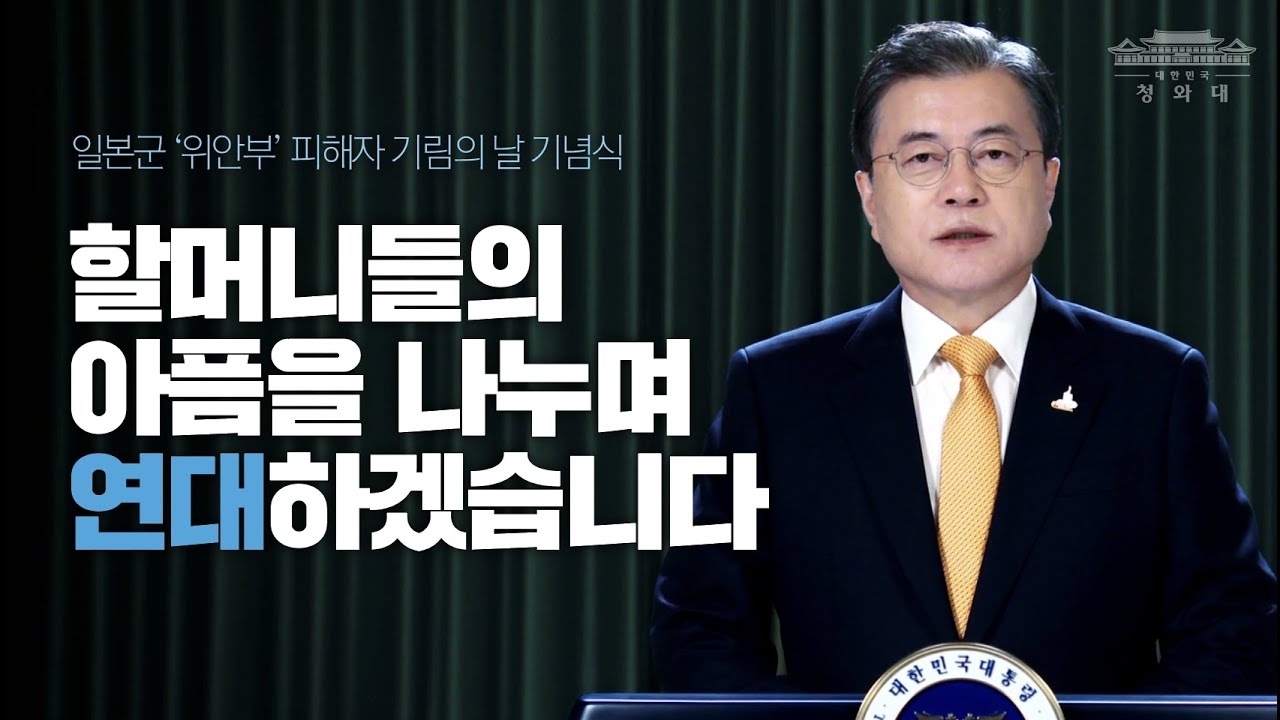이 웹사이트는 제19대 대통령 임기 종료에 따라 대통령기록관이 「대통령기록물 관리에 관한 법률」에 의해 이관받아 서비스하는 대통령기록물입니다. 자료의 열람만 가능하며 수정 · 추가 · 삭제는 불가능합니다.
다만, 「개인정보보호법」에 의하여 개인의 정보를 보호받기 원하시는 분은 관련 내용(요청자, 요청내용, 연락처, 글위치)을 대통령 웹기록물 담당자(044-211-2253)에게 요청해 주시면 신속히 검토하여 조치해 드리겠습니다. 감사합니다.
SPEECHES & REMARKS
BRIEFINGS
Message from President Moon Jae-in on National Day to Honor Japanese Military Comfort Women Victims

Fellow Koreans, elderly comfort women victims of the imperial Japanese military and their relatives,
I am grateful to you all for joining today’s ceremony for the National Day to Honor Japanese Military Comfort Women Victims despite many inconveniences caused by COVID-19 prevention efforts and recent heavy downpours.
My good wishes go to those elderly victims who could not attend this ceremony. I also pray that the souls of those who already left us will rest in eternal peace.
Today marks the day 29 years ago when Kim Hak-sun became the first among the surviving victims to testify about what she had suffered. Encouraged by her testimony, other elderly victims went public with their own stories of suffering and pain. At the same time, they have practiced the value of women’s rights and peace as living witnesses of history.
Their courageous testimonies have made it possible for the comfort women issue to be included in a report by the U.N. Special Rapporteur on human rights. Moreover, the issue has been defined as a war crime by an international human rights court.
In addition, civic groups and academic experts at home and abroad have banded together with these grandmothers, and many of our people have been expressing empathy with their pain through long-standing joint efforts. The international community also recognizes their cause as a “universal women’s human rights movement” and “global peace movement.”
The Government will do all it can to come up with practical and feasible measures so that the grandmothers’ courage and dedication will be rewarded by having their dignity and honor restored.
The overriding principle in resolving the issue is a “victim-centered approach.” The Government will seek an acceptable solution until the time that the grandmothers themselves say they feel enough has been done. We will push for investigation, research and education more effectively to set history right so that an increasing number of students and citizens can stand in strong solidarity with the grandmothers while sharing in their pain.
I always worry about the health of these grandmothers. We will look after the surviving 17 grandmothers more carefully to ensure that they can enjoy healthy and stable lives.
I express my deep respect for these grandmothers who went beyond being victims and have constantly instilled new values in our society as human rights activists.
The grandmothers are now proposing a new direction to solve the comfort women issue. They have called for the creation of a plan for future generations – both in Korea and Japan – to advance toward peace and human rights while inheriting the achievements of the civic movement. It is their hope that all the efforts to resolve the comfort women issue – the actions, results and verification of the results – are open and transparent, so people from diverse backgrounds can participate.
I will etch deep into my heart the words of these grandmothers who sublimated their horrendous pain into life-guiding wisdom.
On the National Day to Honor Japanese Military Comfort Women Victims today, I hope that the pain and wounds of the grandmothers will heal, albeit a little, and that our people will contemplate their spirit together.
I will always stand with those supporting the values of human rights for women and peace. I express my gratitude and respect for the grandmothers’ noble lives.
Thank you.



